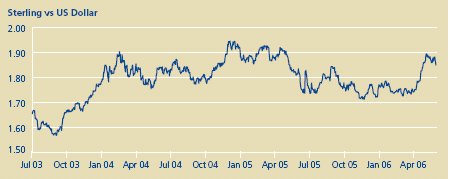With the recent volatility in currency markets and in particular the weakness of the US Dollar, many companies are again revisiting their foreign exchange risk management strategy.
Before entering into any financial instrument, companies firstly need to be clear on what they are aiming to achieve from a hedging strategy. Only then should derivatives products be considered.
What is my risk?
There are two basic types of foreign exchange risk:
1. Transactional risk
2. Translational risk
Transactional risk involves actual flows of cash in the future, for example an export or an import. Translational risk involves the foreign exchange difference experienced when re-converting a foreign exchange value into the functional currency of the company concerned. The translation may be in respect of earnings, costs, assets or liabilities. Frequently translation risks turn into transaction risks at a later date as earnings are repatriated or assets and liabilities realised.
The hedging decision
The first step in any hedging strategy is to be very clear on two questions:
1. The size of it – is the risk big enough to cause an issue?
If the answer is ‘yes’ then answer:
2. What are you actually trying to achieve?
Once you are clear on these questions, you are then able to consider possible approaches to mitigating these risks, some of which may include entering into financial instruments with banks.
How much risk can you take?
The approach most appropriate for you will depend on a number of factors, however the one key factor is that the strategy is consistent with the risk appetite of the Board. As with many risks such as insurable risk, companies choose to accept some risk and lay off other risks with third parties; the same holds true with foreign exchange risk management. The strategy must be consistent with the Board’s expectations and understanding of those risks which are worth accepting, and those which are unacceptable and therefore should be hedged in the market.

The minefield of derivatives
There is now a bewildering variety of derivatives being actively marketed by banks. At a time when the exchange rate already appears to be against you, a forward foreign exchange deal can seem to merely be locking in the bad situation, while buying an option can look very expensive.
There are a number of issues to address before entering into a complex derivative – there have a number of examples of derivatives losses, many of which were due to a lack of understanding of the financial instrument being transacted.
There are structures designed with options embedded such that there is no net premium when entered into. The buyer must beware – such derivatives are certainly not ‘free’.
Our approach
Deloitte have significant experience working with a wide range of companies to help them determine the best solution for them, and the most appropriate financial instruments to mitigate the risks.
Our approach is to help you quantify the risk, identify possible risk mitigation techniques, illustrate the financial effects of the alternative strategic options, and help facilitate discussions with the Board. Furthermore, we have helped clients set up and review hedging strategies and derivative facilities. The output from this process is a hedging policy, which is justifiable to internal and external parties, providing the framework by which you can operate in the future.
Deloitte’s specialist knowledge
Deloitte’s Treasury and Capital Markets team has a broad expertise in Treasury Management, employing treasury professionals from industry and combining this with expert consulting and project management skills to help you achieve the required results. They specialise in strategy and risk control of transacting and trading environments, including IFRS, Tax and IT aspects. Our derivative specialists provide expert advice on the appropriate use of complex derivative products as well as valuation techniques and excel in modeling and optimizing hedging strategies.
The content of this article is intended to provide a general guide to the subject matter. Specialist advice should be sought about your specific circumstances.
